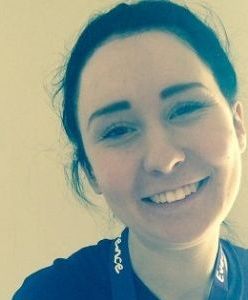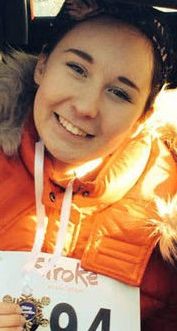
Non-traumatic brain injury causes
Read about how non-traumatic brain injuries can happen.
Bethany suffered a stroke aged 17 while studying for her A-Levels. Now 19, she explains how it resulted in catastrophic brain injury and how stroke can affect younger people.
Published: July 2015. Date of brain injury: 2012 (child aged 17 years).
Talking about the moment in which she was experiencing her stroke, Bethany said: "I was really panicking, my head was throbbing and I was losing all feeling down the left side of my body; the left side of my face was noticeably drooping."
"I didn't know what was happening to me. I was terrified."
Bethany's mum, Christine, called an ambulance which arrived 15 minutes later but by this stage Bethany was unable to walk or talk.
"As I was carried into the ambulance I vomited and the paramedics started asking me whether I'd been taking drugs," she said. "There was an assumption that because I was a teenager my problems must be drug or alcohol-related but I've never taken drugs."
At A&E, doctors appeared baffled by Bethany's symptoms and suspected meningitis, an infection of the protective lining of the brain and spinal cord. They ordered a lumbar puncture to get a sample of her spinal fluid but the results were negative.
"Despite my slurred speech and paralysis they did no tests for stroke, where either a blood clot or bleeding caused by a leaking blood vessel restricts blood flow to the brain," she said.
"Crucially I was not given an MRI scan, the only test that can confirm a diagnosis of stroke. I was kept in overnight and fell unconscious. When I awoke the next morning I was completely paralysed and couldn't speak at all. I cried my eyes out; I’d never felt so powerless."
Bethany was eventually seen by a neurologist who diagnosed a suspected stroke and arranged for her to be transferred to Addenbrooke's Hospital in Cambridge later in the day.
The MRI scan confirmed she had suffered a stroke in the brain stem caused by a blood clot, called an ischaemic stroke.
By this stage it was too late for Bethany to have thrombolysis, the treatment that might have dispersed the clot and prevented damage to the brain.
She was left ‘locked in’ for the next week unable to speak or move.
"It was nightmarish," she said. "I could hear people talking about me and my condition but had no way of letting them know that inside my brain I was fine, it was just my body that wouldn't do what I wanted it to."

It took four months before Bethany could communicate with anyone after speech therapy at London's Northwick Park Hospital.
"I wasn't expected ever to fully recover. I was in hospital for ten months in total," she said.
“I always had an image in my mind of walking and talking again, just hanging with my friends like normal, so I focused on that and wasn’t settling for anything less – I was quite stubborn!”
At first, physiotherapists focused on helping Bethany regain movement in her head and neck while working on relaxing her arm and leg muscles, which had become stiff from lying in bed.
Secondly, they worked on her walking.
She spent eight months at Northwick Park Hospital’s regional rehabilitation unit, received daily physiotherapy and was given exercises to do in bed each night with the help of her family.
“It’s funny, it seems like physiotherapy has now become an essential part of my life. If I don’t have it I feel like I just haven’t tried to get better or I feel my dream of walking completely unaided is further away or harder to achieve.”
Bethany found that learning to stand and taking tentative first steps were big achievements but most recently has been able to take part in fundraising runs.
“My confidence is probably the hardest part to ever gain back," she said "I’m still not fully confident but the physiotherapy is definitely helping this. As my legs get stronger my confidence grows.”
Bethany's recovery has been a two-and-a-half-year battle but she can now walk and talk again and is returning to college to complete her A-levels in the autumn.
"If my symptoms had been recognised sooner and treated with clot-busting drugs I might not have suffered such catastrophic brain damage and avoided all I've been through," She explained.
"Medics shouldn't just assume slurred speech in young people is down to drugs or booze."

Read about how non-traumatic brain injuries can happen.

Did you know that around 40,000 children experience a brain injury every year? That’s one every 15 minutes.

Bethany, from Bedfordshire, was 17 when she suffered a stroke leaving her with a brain injury. In this Q&A, she talks about her experience.